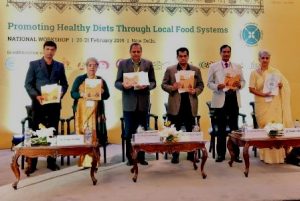Promoting Healthy Diets through Local Food Systems
We’ll never get the benefit of the demographic advantage if we don’t fix the issue of malnutrition, pointed out NITI Aayog CEO Amitabh Kant.
 With an aim to improve nutritional choices and enhance dietary diversity of India, a National Workshop on ‘Promoting Healthy Diets Through Local Food Systems’ was recently organised in New Delhi.
With an aim to improve nutritional choices and enhance dietary diversity of India, a National Workshop on ‘Promoting Healthy Diets Through Local Food Systems’ was recently organised in New Delhi.
Under POSHAN (Prime Minister’s Overarching Scheme for Holistic Nourishment) Abhiyaan, the Government has been promoting consumption and household/community production of locally available nutritionally rich food resources as a priority concern where the academic institutions are to serve as resource centres and Nutrition Support Units to the Districts and State administration for technical training and concurrent monitoring support to achieve the goals of POSHAN Abhiyaan which are to ensure attainment of malnutrition free India by 2022.
The programme targets reduction of under-nutrition, anemia and low birth weight by ensuring convergence of evidence-based nutrition interventions and by “creating a mass movement” (Jan Andolan) for food nutrition in India. One of the key nutrition interventions to meet these targets is to improve the quality of daily diets by making them nutritionally rich and locally sustainable.
“Envisaging a convergence between the Aspirational Districts programme and POSHAN Abhiyaan, the workshop was conceptualised to design institutional collaborations between academia and State Governments across these districts.”
The NITI Aayog in collaboration with National Centre of Excellence and Advanced Research on Diets (NCEAR-D), UNICEF India and Lady Irwin College, organised the workshop where an exhibition of more than 250 best practices, innovations and local food products developed by various agriculture and food technology institutions was another attraction.
Also read: Micro-irrigation and Agricultural innovation on the radar
The inaugural session of the workshop was addressed by Amitabh Kant, CEO, NITI Aayog, Rakesh Srivastava, Secretary, Ministry of Women and Child Development, Dr. Trilochan Mohapatra, Secretary, DARE and DG, ICAR, Dr. Yasmin Ali Haque, UNICEF Representative in India and Dr. Anupa Sidhu, Director, Lady Irwin College and Chairperson, NCEAR-D.
“NITI Aayog has the mandate of convergence: of departments, of ideas, of states and of institutions. Nutrition is foundational to transformation of Aspirational Districts and at centre of govternment’s efforts to harness India‘s demographic advantage,” asserted Kant.
“We’ll never get the benefit of the demographic advantage if we don’t fix the issue of malnutrition. The workshop will be a big catalyst and driving force in making a radical change to transforming nutrition in India,” added Kant.
The workshop saw the participation of State Governments, UN agencies such as UNICEF and FAO, and development partners operating at the district level. It also included over 40 academic institutions (Home science colleges, food, nutrition and extension education departments of Agriculture universities) from across 16 states, apart from eminent academics and experts who shared implementation strategies and innovative success stories.
On the need to promote healthy diets, Kant said, “Nutrition will not succeed till the people of India are committed to transformation. We need more hands and support on ground to ensure a healthy diet reaches all.”
The workshop provided a platform to reach a common understanding of diet diversity problems in Aspirational Districts across India and learn from national and international examples where nutrition academia and state governments have collaborated.
Also read: India’s Sixth National Report to the Convention of Biological Diversity
“Information and education is critical if we are to move towards a more nutritious and healthy diet,” said Srivastava.
The Aspirational Districts Dietary fact sheets were released during the Workshop which is seen as helpful for both academicians and policy makers in examining the gaps in the daily diets of children and mothers of reproductive age group in terms of recommended dietary intake. The academic institutions can make an Action Plan to fill the gap which will be shared with District administration for collaboration and implementation purpose. Further, academic institutions were also encouraged to frame scientific methodologies and prepare achievable action plans with clearly defined indicators.
